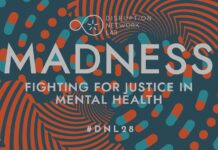The story begins this way: People often think I’m kidding when I tell them that in four years of a Ph.D. program in Psychology at Duke University, I learned little or nothing that has been of use to anyone, never mind something that might reduce human suffering. But I am as serious as I can be when I say that. In college at Harvard, I had majored in English, and although that department’s faculty tended to have an approach to literature that I found fairly silly and that took one away from the wonders of great literature, that was nothing compared to the tragically impoverished view of human beings that I encountered in graduate school at Duke.
My first semester at Duke, I was offered the chance to teach an honors course to undergraduates about anything I chose, and I chose “Concepts of Normality” and aimed to convince my students that every model of “emotional normality” is deeply flawed. I then spent a couple of decades immersed in clinical psychology and research and teaching, and though I loved the teaching because of the students and because I could teach a critical thinking approach, and though I valued some of my colleagues, I could not bear the focus of so many on pathology and the smugness of those psychologists who seemed genuinely to believe that they knew more about their patients than the patients knew about themselves.
In 1994, when I began to write They Say You’re Crazy: How the World’s Most Powerful Psychiatrists Decide Who’s Normal — my exposé of what I learned as a member for two years of the now-infamous DSM-IV Task Force, to which Allen Frances had appointed me, I was exceedingly uncomfortable with my opening paragraphs. Somehow, I realized that that was because they were distant and abstract, even though the book was to be about the totally unjustified pathologizing of so much of human emotions and behavior. Relieved by this recognition, I immediately wrote a number of real-life vignettes about specific people, and the book came alive for me in a more energizing way.
That same year, with both of my children now grown up and off on their own, I realized how much I had missed theatre, something in which I had not participated much since my high school days. I spent three months in Los Angeles studying acting full-time at Estelle Harman’s Actors’ Workshop. Estelle was a very distant cousin and a highly respected acting coach. During those three months, I spent illuminating times with her youngest daughter, Eden Harman (later Eden Harman Bernardy), who was a brilliant acting teacher, script analyst, playwright, and visual artist…and who truly treasured every moment of life. Our family has a long tradition of storytelling, and Eden and I told each other many stories. At several points, when I was quoting interesting or moving things that other people had said, Eden stopped me, saying, “That was a great line!” Soon, she told me I should start writing plays. So I did.
Though it has been hugely challenging, because as a teacher and nonfiction writer, my purpose had been to spell everything out as clearly as possible, and that is deadly for playwriting, it has been glorious to get back to focusing on human beings in all their richness, complexity, secrecy, and mystery and to do so without pathologizing them!
Working over the decades with psychiatric survivors and with military veterans (and there is often overlap between the two groups), I learned from them what helps them heal: connection and creation. The connection can be with a person, a group, an organization, an animal, a garden, a spiritual entity, one of the arts, education, political action, and more. The creation can be in what are usually thought of as the arts or in the creation of one or more relationships with others or of a garden or a new entity such as a community or political initiative, a business, and much else.
So my play, SHADES, and my film, “Is Anybody Listening?” are about people who have experienced major troubles, even trauma or other tragedies, who have dark secrets that torment them, but who use connection, love, humor, and creativity to come through, even to heal. And no one in the play or the film is pathologized. In fact, a character in SHADES says, “Just because you suffer doesn’t make you mentally ill,” and in the film, we explicitly criticize the tendency for people to call the effects of war trauma and rape trauma “mental illnesses,” and we offer a very simple way to help those who have been so traumatized, i.e., by listening to them with 100% of our attention, our whole hearts, and respect.
The SHADES director, Alex Keegan, and her cast of Ashley Wren Collins, Carson Lee, Hal Robinson, and Holly Walker have, in rehearsals, already exquisitely embodied the rich humanity of their characters, and you will love them!
I hope that any of you who might be in the New York area between November 9 and December 17 will come to see SHADES (use the discount code HALFSHADES at www.cherrylanetheatre.org). If you wish also to come see the one (free, public) screening of “Is Anybody Listening?” on November 13 at 4:15 p.m. please email [email protected] and say you will be attending the screening of the film on November 13. If you are a current or former member of the military or a family member of one, at [email protected], you can reserve free tickets for November 13 for either the SHADES performance at 2 p.m. or the one at 7 p.m. that day.
Looking forward to seeing you there!















What you suggest is largely what I am doing to help my wife heal from d.i.d.. I connect (attach) with each one of the girls in my wife’s system and as they connect to me and heal, it allows them to tear down the dissociative walls and connect to each other. I’ve never seen the various girls in the system as anything other than ‘girls’ albeit girls who are ‘part’ of my wife. I don’t treat them as crazy, insane or ill…just traumatized girls who are starved for love, safety and a home to call their own.
Report comment